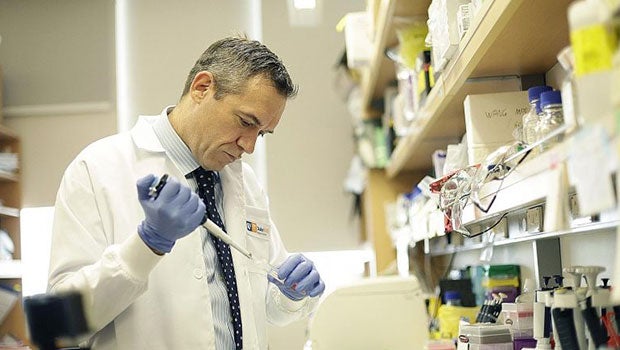
The new study led by Professor Stuart Cook has overturned previous findings about the role of protein interleukin 11. PHOTO: GIN TAY FOR THE STRAITS TIMES
By Raffaella Nathan Charles, The Straits Times
Breakthrough by Duke-NUS Medical School team can lead to new methods of treatment
A team of researchers from the Duke-NUS Medical School have made a breakthrough: A protein called interleukin 11 (IL11) is the main protein activating and speeding up organ failure.
The researchers, led by principal investigator Stuart Cook, experimented on donated heart-tissue samples of 84 patients from the National Heart Centre Singapore (NHCS) for their research, which started five years ago.
They were trying to find a new target gene contributing to fibrosis, where connective tissue is produced in excess, leading to organ failure of the liver, eye, lungs, skin, heart and the kidney.
Previously, the protein believed to be the main culprit was the transforming growth factor beta (TGFB1), but the removal or reversal of it spelt adverse side effects in patients, leading to cancers or chest infections.
Professor Cook, director of the Duke-NUS Programme in Cardiovascular and Metabolic Disorders, and his team looked at the samples cell by cell and gene by gene, and found that IL11 had a dominant response during fibrosis.
The revelation broke down all previous misconceptions that IL11 was harmless and dormant in fibrosis.
Prof Cook even cited a previous study in 2010 identifying IL11 as anti-fibrotic, the complete opposite finding of his new results.
Professor Terrance Chua, medical director of NHCS, said: "Currently, over 225 million people suffer from heart or kidney failure." There is currently no treatment to prevent fibrosis, he added.
Prof Cook said that more Singaporeans, especially, suffer from the three most common diseases that lead to heart failure - coronary heart disease, hypertension and diabetes - as compared with other Asians, Americans and Europeans, likely due to genetics.


The novel discovery, however, has the potential to change things around.
"Basically (IL11 is) a switch that makes TGFB1 fibrotic. But if we turn off IL11, TGFB1 doesn't work anymore," said Prof Cook. "If we can turn IL11 and its receptor off in any way... it will improve fibrosis."
Along with Assistant Professor Sebastian Schaefer, who is part of his research team, Prof Cook set up a biotechnology company called Enleofen Bio earlier this year, licensing their research exclusively to the company.
They will work with British-and United States-based bio-pharmaceutical firm Abzena to develop an antibody that inhibits IL11 by mid-2019, said Prof Cook, with clinical trials by 2020.
The Duke-NUS and NHCS findings have been published online in the prestigious journal Nature.
SOURCE: THE STRAITS TIMES, SINGAPORE PRESS HOLDINGS LIMITED. REPRODUCED WITH PERMISSION.
Contributed by














 Get it on Google Play
Get it on Google Play